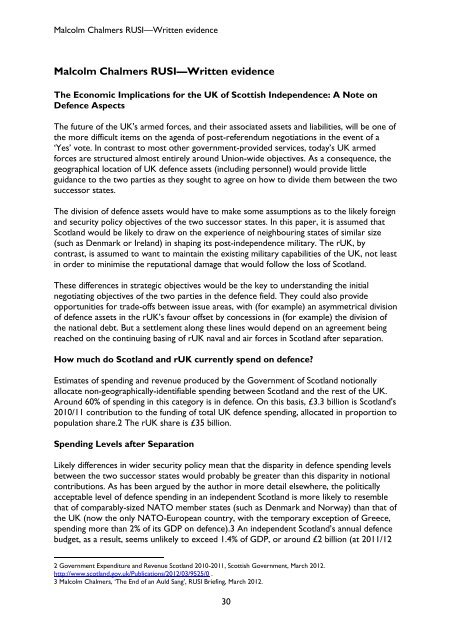SELECT COMMITTEE ON ECONOMIC AFFAIRS - Parliament
SELECT COMMITTEE ON ECONOMIC AFFAIRS - Parliament
SELECT COMMITTEE ON ECONOMIC AFFAIRS - Parliament
Create successful ePaper yourself
Turn your PDF publications into a flip-book with our unique Google optimized e-Paper software.
Malcolm Chalmers RUSI—Written evidence<br />
Malcolm Chalmers RUSI—Written evidence<br />
The Economic Implications for the UK of Scottish Independence: A Note on<br />
Defence Aspects<br />
The future of the UK's armed forces, and their associated assets and liabilities, will be one of<br />
the more difficult items on the agenda of post-referendum negotiations in the event of a<br />
‘Yes’ vote. In contrast to most other government-provided services, today’s UK armed<br />
forces are structured almost entirely around Union-wide objectives. As a consequence, the<br />
geographical location of UK defence assets (including personnel) would provide little<br />
guidance to the two parties as they sought to agree on how to divide them between the two<br />
successor states.<br />
The division of defence assets would have to make some assumptions as to the likely foreign<br />
and security policy objectives of the two successor states. In this paper, it is assumed that<br />
Scotland would be likely to draw on the experience of neighbouring states of similar size<br />
(such as Denmark or Ireland) in shaping its post-independence military. The rUK, by<br />
contrast, is assumed to want to maintain the existing military capabilities of the UK, not least<br />
in order to minimise the reputational damage that would follow the loss of Scotland.<br />
These differences in strategic objectives would be the key to understanding the initial<br />
negotiating objectives of the two parties in the defence field. They could also provide<br />
opportunities for trade-offs between issue areas, with (for example) an asymmetrical division<br />
of defence assets in the rUK’s favour offset by concessions in (for example) the division of<br />
the national debt. But a settlement along these lines would depend on an agreement being<br />
reached on the continuing basing of rUK naval and air forces in Scotland after separation.<br />
How much do Scotland and rUK currently spend on defence?<br />
Estimates of spending and revenue produced by the Government of Scotland notionally<br />
allocate non-geographically-identifiable spending between Scotland and the rest of the UK.<br />
Around 60% of spending in this category is in defence. On this basis, £3.3 billion is Scotland's<br />
2010/11 contribution to the funding of total UK defence spending, allocated in proportion to<br />
population share.2 The rUK share is £35 billion.<br />
Spending Levels after Separation<br />
Likely differences in wider security policy mean that the disparity in defence spending levels<br />
between the two successor states would probably be greater than this disparity in notional<br />
contributions. As has been argued by the author in more detail elsewhere, the politically<br />
acceptable level of defence spending in an independent Scotland is more likely to resemble<br />
that of comparably-sized NATO member states (such as Denmark and Norway) than that of<br />
the UK (now the only NATO-European country, with the temporary exception of Greece,<br />
spending more than 2% of its GDP on defence).3 An independent Scotland’s annual defence<br />
budget, as a result, seems unlikely to exceed 1.4% of GDP, or around £2 billion (at 2011/12<br />
2 Government Expenditure and Revenue Scotland 2010-2011, Scottish Government, March 2012.<br />
http://www.scotland.gov.uk/Publications/2012/03/9525/0 .<br />
3 Malcolm Chalmers, ‘The End of an Auld Sang’, RUSI Briefing, March 2012.<br />
30

















